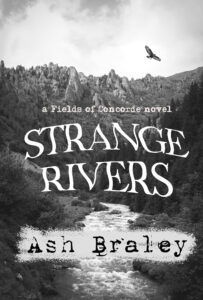An interview with the author – Strange Rivers

Ash Braley sat down for an interview with fellow writer Allie E. to discuss Strange Rivers, her latest novel. Here are some of the excerpts:
Allie E.: So we return to the Fields of Concorde – I was excited to catch up with the characters about what’s been going on there. It’s been – what, six months since An Older Kind of Justice came out? Didn’t you tell me you were taking a break to work on other projects? Second novels are ten times harder than the first, why did you take that on so soon?
Ash B. [groans] This one tormented me, it didn’t let up on me until I finally just sat down and started working on it. I had heard from a lot of people that An Older Kind of Justice was just a beginning, they needed to know what happened next. I had left the characters facing a lot of things that could go wrong, and all that fertile ground was a gift, if you want to look at it that way. There was so much I could do with it, and clearly there was a lot of trouble and mayhem on the way.
A.E.: So they couldn’t just sit down to eat dinner and then watch tv? Watch a beautiful sunset every evening? Perhaps take up bonsai or flower arranging?
A.B. If only! Part of me hated bringing more drama to the Fields, but let’s face it, happily-ever-after is not the stuff of interesting fiction.
A.E.: True. I was annoyed at you for making the characters suffer but I had to know what happened. The characters had a little help through it all, right? The presence of the hawk? Is there some force behind the Fields of Concorde, lending moral support or maybe manipulating things in an unseen way?
A.B.: You’re not tricking me into giving that away.
A.E.: Okay fine, be that way. [laughs] I remember you calling me in tears a couple of times when you were writing OKOJ, it was emotional for you. What was the experience with Strange Rivers? Seems like you were deep into the minds and hearts of the characters. And writing in the first person from multiple points of view – the muse must have been shouting in your ear.
A.B.: Strange Rivers was an emotional process but in a different way. Jake is the main character in Strange Rivers, and since he’s not a big talker, the only way to tell his story – and he’s a complex person – was with interior monologue. It turned out that I didn’t know him as well as I thought I did – for instance, he surprised me by being very funny, although not always intentionally. I had to dive into the complexities of his emotions, it was rewarding but not always pleasant.
A.E.: Rewarding how?
A.B.: He starts to find things he likes about himself, his strengths, that’s something he never did before. But then he’ll go right down the rabbit hole again, thinking he’s worthless. And then he reaches a point where he has a chance to turn things around and move past that – I loved writing him through that process. Cassandra too, she has a reckoning of her own that she never saw coming. Suddenly her life is not what she thought.
A.E. Should people read OKOJ before they read Strange Rivers?
A.B. Highly recommended although not strictly necessary. It’s a quick read though so there are no excuses there. I don’t know about you, but I can’t stand a follow-on where the first ten pages are a recap of what happened in the previous novel. Strange Rivers wasn’t intended to be a stand-alone, read OKOJ first to get the whole story.
A.E.: One last question. The title, taken from the Joan Baez song? And the rest of the music that plays in the background throughout the book?
A.B.: I originally had a different title, but I happened to hear Joan Baez’s recording of “Strange Rivers” and I heard something in it that brought me to my knees. There is a kindness there as well as a deep sadness and it was exactly what I was feeling about the story I was writing. There are other songs that make me really “feel” a character, or a situation, hence the playlist at the beginning of the book.
A.E.: One more last question, sorry. Will we see the Fields again?
A.B.: Same answer as last time, it’s not up to me. If the muse dictates a story, I suppose I’ll have no choice but to transcribe it.
A.E.: We’ll leave it there then! Thanks for sitting down with me.
A.B.: Always a pleasure.

